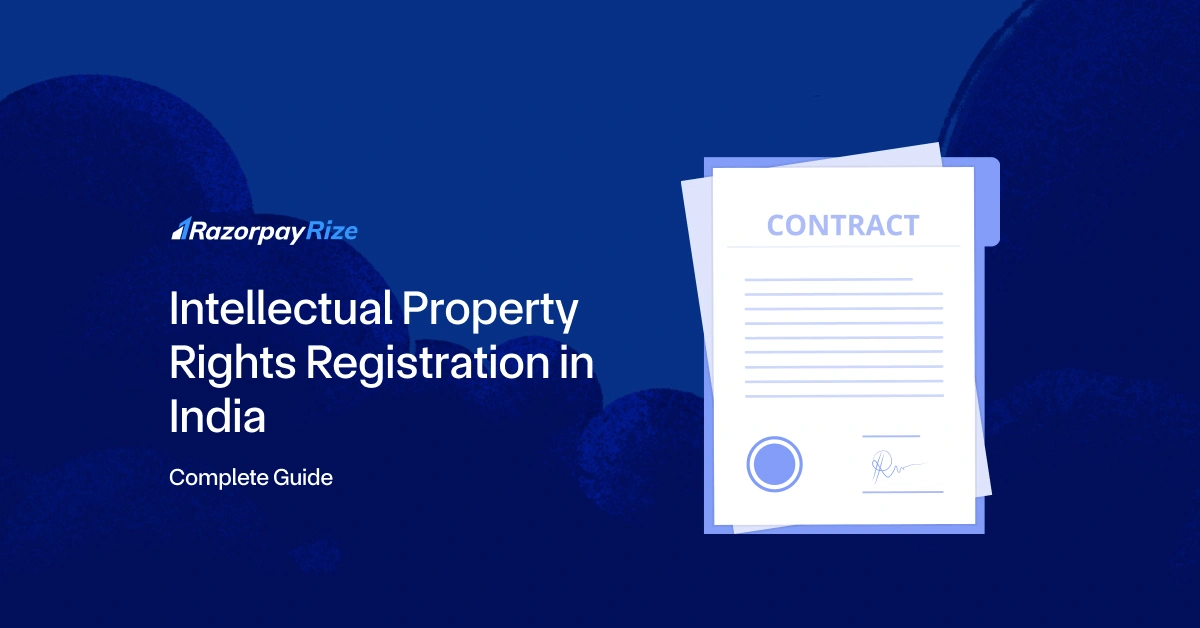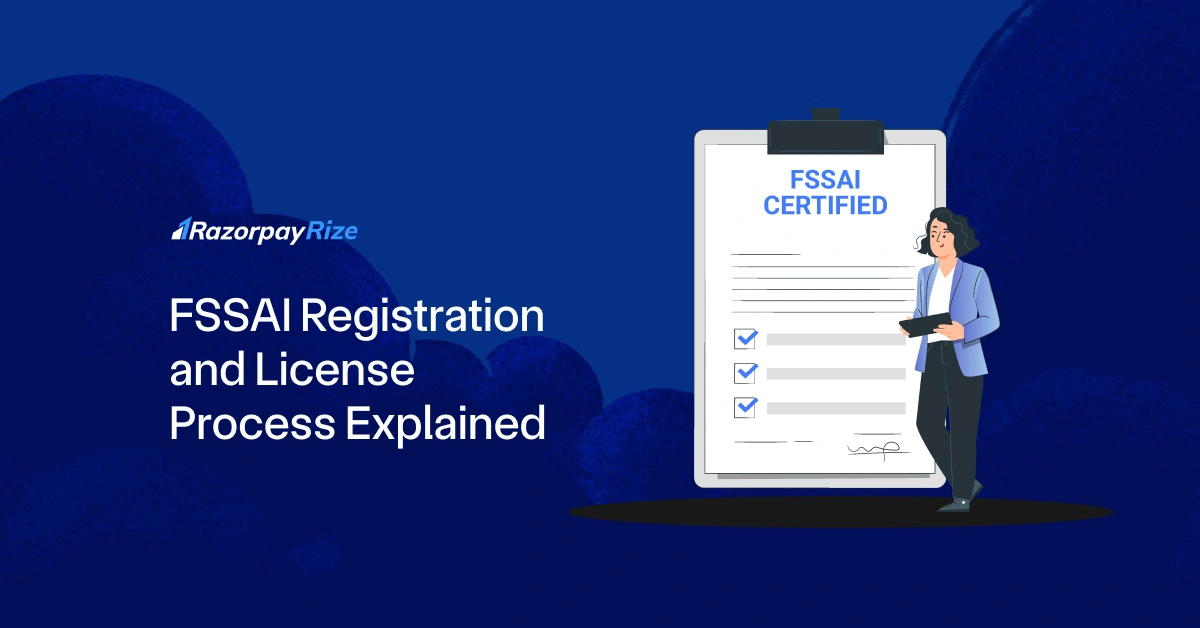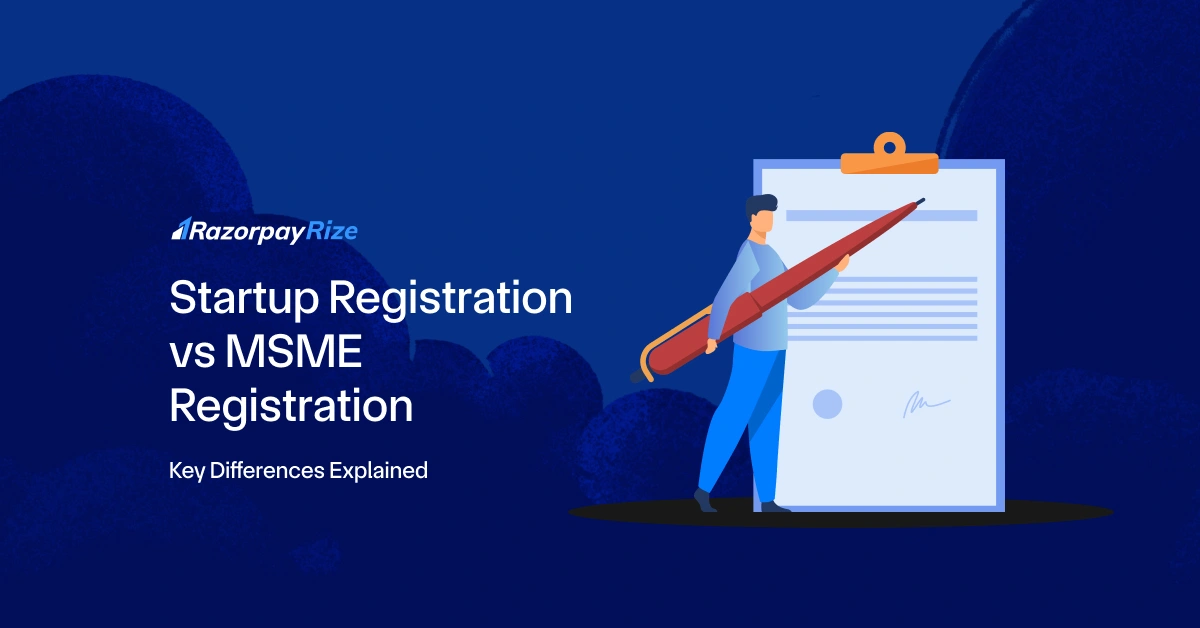In today’s innovation-led economy, protecting intellectual property is vital. India offers a robust legal framework for IPR registration, helping creators, inventors, and businesses safeguard their ideas. India received 82,811 applications in FY 2022–23, a 24.6% increase over the previous year and a total of 466,580 trademark applications, reflecting growing IP awareness. Supported by initiatives like Startup India and the National IPR Policy, the system ensures legal exclusivity, commercial advantage, and innovation protection.
This guide covers the essentials of IPR registration in India, including types of IP, eligibility, documents, and the registration process.
Table of Contents
What are Intellectual Property Rights?
Intellectual Property Rights (IPR) are legal protections granted to individuals or entities over their original creations of the mind. These include inventions, literary and artistic works, symbols, names, designs, and images used in commerce. The purpose of IPR is to encourage innovation, creativity, and fair competition by rewarding creators for their original work.
IPR find their legal basis in Article 27 of the Universal Declaration of Human Rights (UDHR) and are internationally recognised through treaties such as the Paris Convention for the Protection of Industrial Property and the Berne Convention for the Protection of Literary and Artistic Works, both administered by the World Intellectual Property Organization (WIPO). In India, IPR are protected under various laws, including the Patents Act 1970, Copyright Act 1957, Trade Marks Act 1999, and Designs Act 2000.
Types of Intellectual Property Rights
India recognises several types of Intellectual Property Rights, each serving a specific purpose:
- Copyright: Protects original literary, dramatic, musical, and artistic works, as well as cinematograph films and sound recordings. Copyright protection is automatic upon creation and lasts for 60 years after the author's death.
- Patents: Grant exclusive rights to inventors for their novel, non-obvious, and industrially applicable inventions. Patents are valid for 20 years from the date of filing.
- Trademarks: Distinguish the goods or services of one enterprise from another. Trademarks can be words, phrases, symbols, or designs. Registration is valid for 10 years and can be renewed indefinitely.
- Geographical Indications: Identify goods originating from a specific geographical location, possessing qualities or reputation attributable to that origin. Examples include Darjeeling Tea and Basmati Rice. GI registrations are valid for 10 years and are renewable.
- Industrial Designs: Protect the ornamental or aesthetic aspects of an article. Design registration is valid for 10 years, extendable by 5 years.
- Plant Varieties: Safeguard the rights of plant breeders and farmers under the Protection of Plant Varieties and Farmers' Rights Act, 2001. Registration is valid for 15 years for annuals and 18 years for perennials with provisions for renewal.
- Trade Secrets: Protect confidential business information that provides a competitive advantage. Trade secrets are not registered but can be protected through contracts and non-disclosure agreements.
What is the need for Intellectual Property Rights?
IPR registration is crucial for several reasons:
- Promotes innovation by providing incentives to creators and inventors
- Drives economic growth by encouraging investment in research and development
- Protects creators' rights, ensuring they can reap the benefits of their work
- Supports ease of doing business by enabling technology transfer through licensing and joint ventures
- Fosters creativity and enables informed consumer choices by distinguishing genuine products from counterfeits
IPR Registration Eligibility Criteria in India
To be eligible for IPR registration in India, your intellectual property must meet certain criteria:
- Copyright: The work must be original and fixed in a tangible medium of expression.
- Patent: The invention must be novel, non-obvious, and industrially applicable.
- Trademark: The mark must be distinctive and not confusingly similar to existing marks.
- Design: The design must be new, original, and not previously disclosed.
- Geographical Indication: The product must have a specific geographical origin and possess qualities or reputation attributable to that origin.
- Plant Variety: The variety must be novel, distinct, uniform, and stable, as outlined under the Protection of Plant Varieties and Farmers’ Rights Act, 2001.
Required Documents for IPR Registration in India
The documents required for IPR registration vary depending on the type of intellectual property:
- Copyright:
- Application Form IV
- Copy of the work(literary, artistic, musical, etc.)
- Identity and address proof of the applicant
- Power of Attorney (if applicable)
- Patent:
- Form 1: Application for grant of patent
- Form 2: Complete or provisional specification
- Form 3: Statement and undertaking under Section 8
- Form 5: Declaration as to inventorship
- Form 26: Power of Attorney, if applicable
- Abstract of the invention
- Drawings, if necessary
- Trademark:
- Application Form TM-A
- Representation of the trademark(logo, word, label, etc.)
- Affidavit claiming prior use, if applicable
- Goods/services description
- Power of Attorney (if applicable)
- Design:
- Application Form 1
- Representation of the design
- Power of Attorney (if applicable)
- Priority document
- Geographical Indication:
- Form GI-1: Application for registration of a GI
- Statement of case describing the GI and its uniqueness
- Proof of origin
- Map of the geographical area
- List of authorised users
- Power of Attorney, if applicable
- Plant Variety:
- Application Form PV-1
- Technical Questionnaire
- Denomination of the variety
- Photographs/illustrations
- Seed/propagating material
- Power of Attorney (if applicable)
Step-by-Step Procedure for IPR Registration in India
The IPR registration process in India generally involves the following stages:
- Filing: The applicant submits the required application form, documents, and fees to the appropriate authority (Copyright Office, Patent Office, Trade Marks Registry, or Geographical Indications Registry).
- Examination: The application is examined by the concerned office for compliance with legal requirements and substantive criteria.
- Publication: If the application is found to be in order, it is published in the official journal for public viewing and opposition, if any.
- Grant: If no objections are raised or the objections are successfully overcome, the IPR is granted, and a registration certificate is issued.
Note: The specific steps may vary slightly depending on the type of IPR, but the overall process follows this general flow.
What is the fee for IPR Registration?
The fees for intellectual property registration in India vary depending on the type of IPR and the nature of the applicant (individual, small entity, or large entity). Here are some indicative fees:
Note that these fees are subject to change, and additional fees may apply for certain actions like expedited examination or renewal.
Benefits of IPR Registration in India
Intellectual property registration offers several benefits to creators and businesses:
- Legal exclusivity: Prevents unauthorised use or copying of your intellectual property
- Brand protection: Enhances brand reputation and helps differentiate your products/services in the market
- Monetisation: Enables licensing and commercialisation of your intellectual property
- Business value: Increases the value of your business and attracts investors
- International expansion: Facilitates the protection of your intellectual property in other countries through international agreements
Registering your IPR in India secures your research and development investments, fostering innovation and economic growth.
Conclusion
IPR registration is a vital step in protecting your intellectual creations from misuse or infringement. It provides legal rights and recognition, encouraging innovation and creative growth. Each category of IPR—patents, trademarks, designs, copyrights, and GIs—requires specific documentation and follows a structured process. Properly filed IPR ensures exclusive rights and helps in commercialising your ideas effectively. Hence, securing IPR is essential for safeguarding and leveraging your intellectual assets in India.
Frequently Asked Questions:
Private Limited Company
(Pvt. Ltd.)
- Service-based businesses
- Businesses looking to issue shares
- Businesses seeking investment through equity-based funding
Limited Liability Partnership
(LLP)
- Professional services
- Firms seeking any capital contribution from Partners
- Firms sharing resources with limited liability
One Person Company
(OPC)
- Freelancers, Small-scale businesses
- Businesses looking for minimal compliance
- Businesses looking for single-ownership
Private Limited Company
(Pvt. Ltd.)
- Service-based businesses
- Businesses looking to issue shares
- Businesses seeking investment through equity-based funding
One Person Company
(OPC)
- Freelancers, Small-scale businesses
- Businesses looking for minimal compliance
- Businesses looking for single-ownership
Private Limited Company
(Pvt. Ltd.)
- Service-based businesses
- Businesses looking to issue shares
- Businesses seeking investment through equity-based funding
Limited Liability Partnership
(LLP)
- Professional services
- Firms seeking any capital contribution from Partners
- Firms sharing resources with limited liability
Frequently Asked Questions
How to register intellectual property rights?
IPR registration refers to the process of obtaining legal recognition and protection for your intellectual property, such as inventions, designs, trademarks, and copyrights, by filing an application with the designated government authority in India.
What is the fee for IPR registration?
The fees for IRP registration in India vary depending on the type of IPR—such as patents, trademarks, copyrights, designs, GIs, and plant varieties—and the nature of the applicant (individual, small entity, or others). For instance, patent fees range from ₹1,600 to ₹8,000, trademark fees from ₹4,500 to ₹9,000, and copyright registration starts at ₹500. Each IPR type also has a distinct fee structure and documentation requirement.
What are IPR documents?
IPR documents refer to the set of forms, specifications, representations, and supporting evidence required for intellectual property registration. These may include application forms, abstracts, drawings, affidavits, power of attorney, and copies of the work or invention, depending on the type of IPR being registered.
















